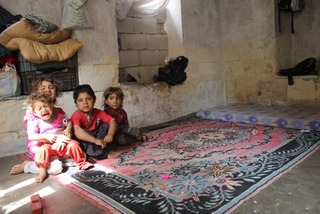By Danielle Spencer
I can see the homes of Kobane, Syria from the refugee camp in Turkey. White houses glinting in the sunlight which looked like I could reach out and touch them. The clouds of smoke which had billowed from the city days before have stopped and the town looks peaceful now - from a distance. Women and men look over the Turkey/Syria border at their home: sitting there is a constant reminder of why they can't go back.
On September 16th, the northern Syrian town of Kobane, - a town predominantly populated with Kurdish people, on the Turkey border came under siege. Since then, reports state that more than 140,000 refugees have flooded into Turkey.
The sound of a nearby explosion echoes around us as the woman I am sitting with tells me about her life and the recent death of her two children. A man overhears this conversation, comes over to us, and the conversation turns to politics - as it inevitably does here. The geopolitical issues we hear on TV news, are very real for the people here, they are living and breathing the headlines we see on a daily basis. The man's eyes well up and before long he is telling me about his cousin who was killed brutally, tied to the back of a car and dragged around town as a warning to others.
Later, as I walked into the school, the searing heat of the Middle Eastern sun hits me. Next came the smell. The sour, acrid smell of people who have not been able to wash for days and of women who have resorted to washing their clothes in the toilet bowl to prevent infection. They wash their clothes in fear, and hesitate to use the toilet to relieve themselves, as they are afraid and embarrassed of using the latrine in front of the men who are using the bathroom to shave.
Men and boys reported feeling anxious that sexual violence could occur here against women and girls - there were no reports of this actually occurring yet - but given the brutality they have fled from at home, it is easy to understand why they are scared. They told me, through tearful eyes, about their children being unable to sleep, of their young sons and daughters having nightmares about being kidnapped and torrid dreams that their mothers and sisters will be raped.
They fled their homes because of these fears, because they had a small taste of the violence to come. They told me stories of girls sold in markets in Kurdish parts of Iraq, of intimidation, and their fears that their sons will be kidnapped never to be seen again.
As one man told me: "We needed to escape before they slaughtered our girls before our eyes."
Humanitarian agencies have a responsibility to respond to the complete inhumane misery endured by this besieged people. Women and girls have endured heinous acts of sexual violence, while men and boys have faced unbearable, physical cruelty.
I was therefore heartened that the CARE emergency gender and protection assessment team worked alongside a number of other humanitarian agencies - because none of us can respond appropriately to this alone. I hope we can work together to ensure that the former residents of Kobane are treated with the dignity and respect they deserve, and receive the psychosocial support they desperately need after suffering some of the most stressful and traumatic experiences I have ever come across in my career in aid work.
With the large influx of refugees into Turkey over the past few days, CARE is currently assessing needs and coordinating with the Turkish authorities and other organizations to support the newly arrived refugees with support such as food, blankets and hygiene items.
Danielle Spencer is the Senior Humanitarian Advisor for Gender and Protection at CARE and works primarily responding to the on-going crisis in Syria. Follow her on Twitter at @daniellewas.
